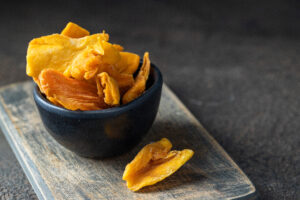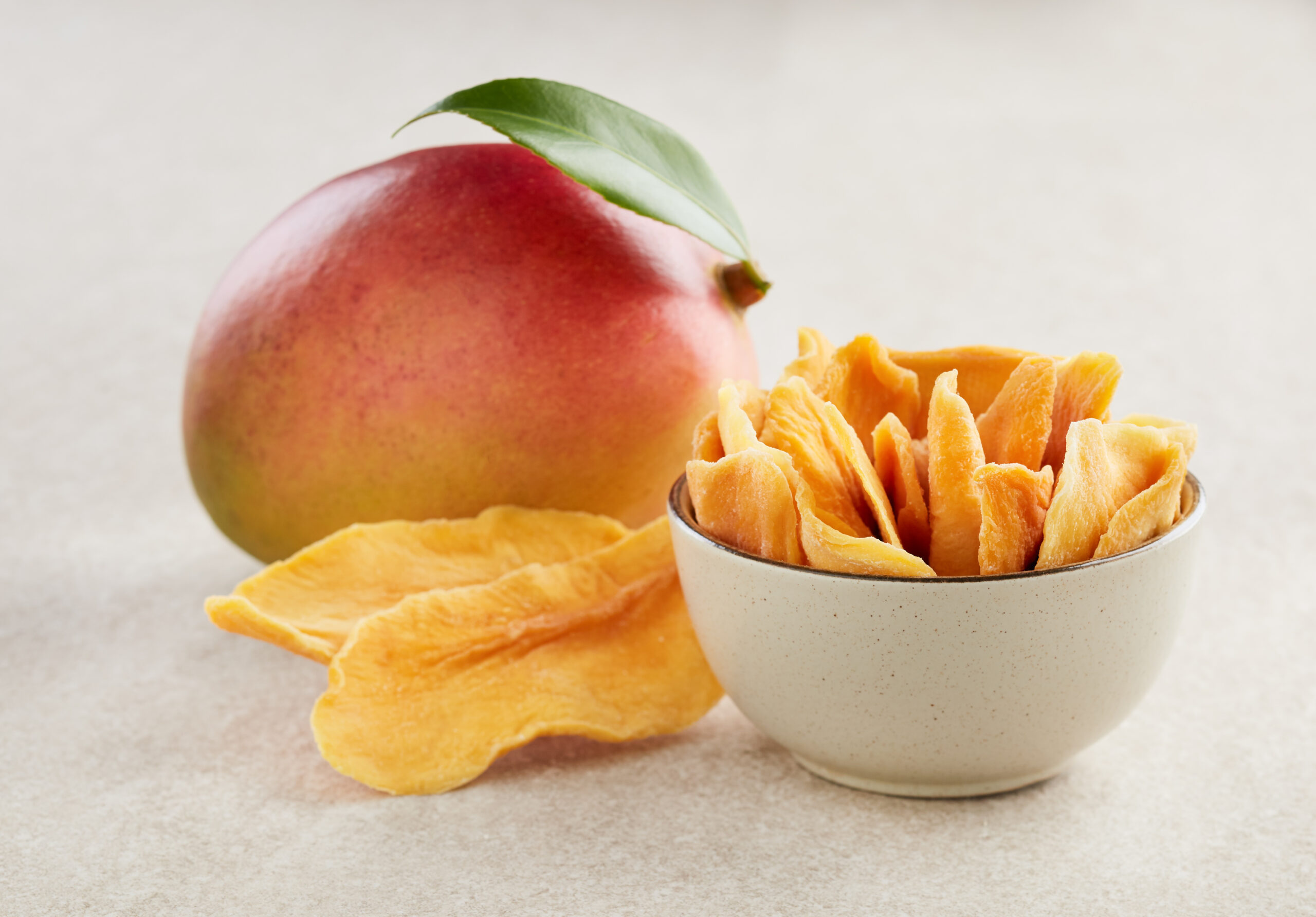Dried mango is not only a tasty treat but also a nutritional powerhouse. Since fresh mangoes are seasonal and mainly available during summer, drying them allows you to enjoy their rich flavor and goodness year-round. While the drying process may reduce some nutrients, dried mango still remains a healthy and convenient snack option.
Ripe mangoes are typically sliced and then dried using methods like sun-drying or dehydration, which help retain much of their natural sweetness, texture, and nutritional value.
Whether you snack on it straight from the pack or use it in recipes, dried mango offers a delicious way to savor the essence of mangoes beyond their season.
In this blog post, we’ll explore the potential benefits of dried mango, its nutritional value, and some potential risks associated with it.
Nutritional Value
The nutritional value of dried mango per 40-gram serving is as follows:
- Energy: 128 kcal
- Protein: 0.98 g
- Total Fat: 0.47 g
- Carbohydrates: 31.4 g
- Fiber: 0.96 g
- Total Sugars: 26.5 g
- Copper: 0.12 mg (13% DV)
- Vitamin C: 16.9 mg (19% DV)
- Niacin (B3): 0.8 mg (5% DV)
- Vitamin B6: 0.134 mg (8% DV)
- Folate: 27.2 mcg (7% DV)
- Vitamin E: 1.61 mg (11% DV)
- Vitamin K: 5.28 mcg (4% DV)
Health Benefits
Dried mangoes are not just delicious and nutritious, they have several health benefits too. Let us have a look at its potential benefits.
Contains Some Antioxidants
Antioxidants are compounds that help reduce oxidation and protect the body from damage caused by free radicals. These harmful molecules come from normal body processes or pollution and are linked to aging, heart disease, cancer, and other diseases.
Mango is particularly rich in polyphenols—plant compounds with health benefits. Key ones in its pulp include mangiferin, gallic acid (the most abundant), quercetin, ellagic acid, and more. It also contains about 25 carotenoids like provitamin A, lutein, alpha-carotene, and beta-carotene, giving it a yellow color.
However, mango can lose 40–50% of its total polyphenols and 35–55% of its carotenoids, including beta-carotene, when exposed to heat. Epoxycarotenoids like luteoxanthin and violaxanthin are even more sensitive, with losses reaching 70–100% at high temperatures. Antioxidant activity also drops by around 40–70%.
That said, dried mango still provides these antioxidants, though in lower amounts compared to the fresh fruit.
May Support Immune Function
Dried mango is a good source of vitamin C, which plays a crucial role in immune function.
While vitamin C, being sensitive degrades when exposed to heat, a 40-gram serving of dried mango still provides 19% of the daily recommended value.
Vitamin C helps keep the immune system balanced. Research shows it can reduce inflammation, support antibody production, and help immune cells work better. It boosts natural killer (a type of white blood cell) cells to fight tumors, affects gene expression, and may limit or slow bacterial growth.
May Enhance Skin Health
Though not as rich as fresh mangoes, dried mango still offers beta-carotene, vitamin C, and vitamin E—three nutrients that play important roles in skin health.
Beta-carotene may help fight acne and signs of aging by boosting collagen, promoting skin cell renewal, and improving skin texture. It also has stronger antioxidant effects than vitamin E and may reduce dark spots by supporting melanin production.
Vitamin C, a powerful antioxidant, supports collagen production, protects the skin from UVA and UVB damage, and enhances overall skin brightness.
Vitamin E helps guard the skin against oxidative stress and sun damage. It may also support skin moisture by strengthening the skin barrier.
Together, these nutrients make dried mango a tasty snack that also supports healthier, more radiant skin.
Other Benefits
Dried mango also provides decent amounts of B-vitamins such as niacin, vitamin B6 and folate.
Natural Energy Boost: Dried mango is rich in natural sugars and carbohydrates, offering a quick energy boost. It also contains small amounts of niacin (vitamin B3), which helps the body convert food into usable energy.
Pregnancy Benefits: It’s also a decent source of vitamin B6 and folate, which support brain development during pregnancy and infancy. Getting enough folate is especially important, as it may help prevent birth defects like neural tube defects.
Additionally, dried mango is a convenient snack option that can be easily carried in your bag or kept in your desk drawer for a quick and nutritious snack.
Unlike fresh mangoes, dried mango has a longer shelf life and does not require refrigeration, making it an ideal snack for on-the-go lifestyles.

How to Enjoy Dried Mangoes
Dried mangoes can be enjoyed in many ways, which makes them a convenient snack option. Here are some ways to enjoy dried mango benefits:
- On-the-Go Snack: Pack dried mangoes in your bag or lunchbox for a convenient and satisfying snack on the go.
- Trail Mix: Mix dry mangoes with nuts, seeds, and other dried fruits to create a nutritious and energizing trail mix for hikes, workouts, or travel.
- Smoothie Bowl Topping: Sprinkle chopped dry mangoes on top of smoothie bowls for added sweetness, texture, and flavor.
- Baked Goods: Add chopped dried mangoes to muffins, cookies, granola bars, or bread recipes for a tropical twist.
- Salad Addition: Toss chopped dry mangoes into salads for a burst of sweetness and color, complementing savory flavors.
Potential Risks
While dried mango is a delicious snack with several health benefits, it may also carry some potential risks:
Conclusion
Dried mango is more than just a sweet and chewy snack—it’s a flavorful source of key nutrients that support immunity, promote healthy skin, and provide a natural energy boost. Its long shelf life and convenience make it a perfect on-the-go option.
While it contains natural sugars and may pose risks for those sensitive to sulphites or managing sugar intake, enjoying it in moderation can offer both taste and health benefits.
Whether in trail mix, smoothie bowls, or eaten on its own, dried mango is a delicious way to enjoy mangoes year-round.
You may also read
Dry Apricot Benefits, Nutrition, Caution, Uses
